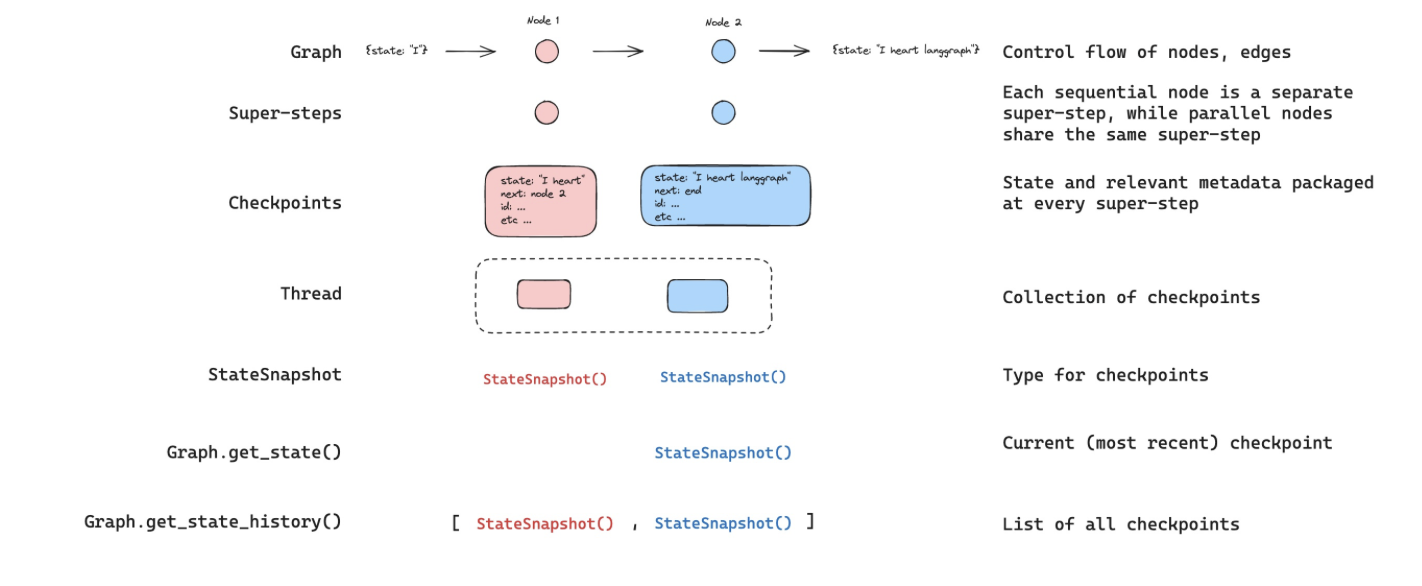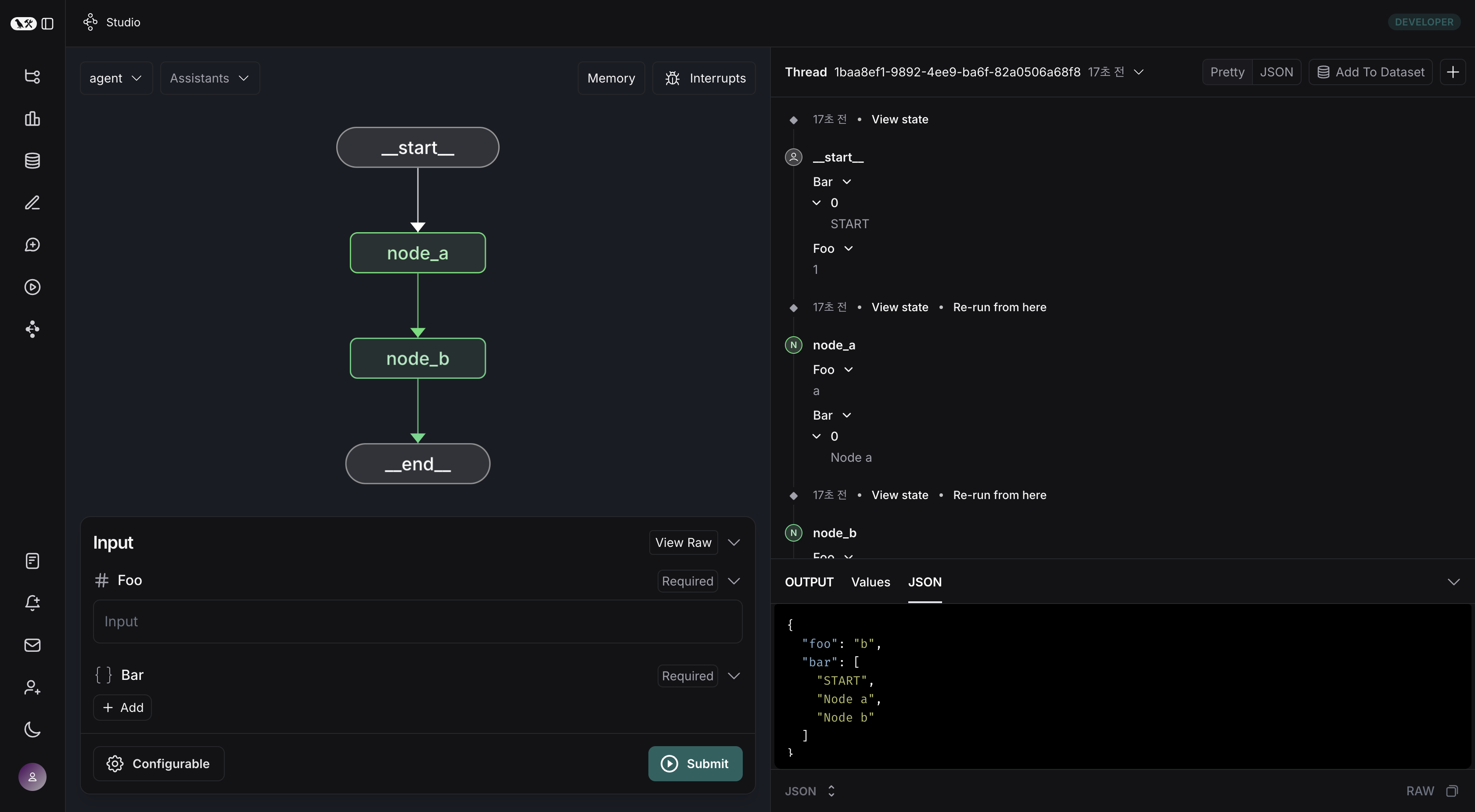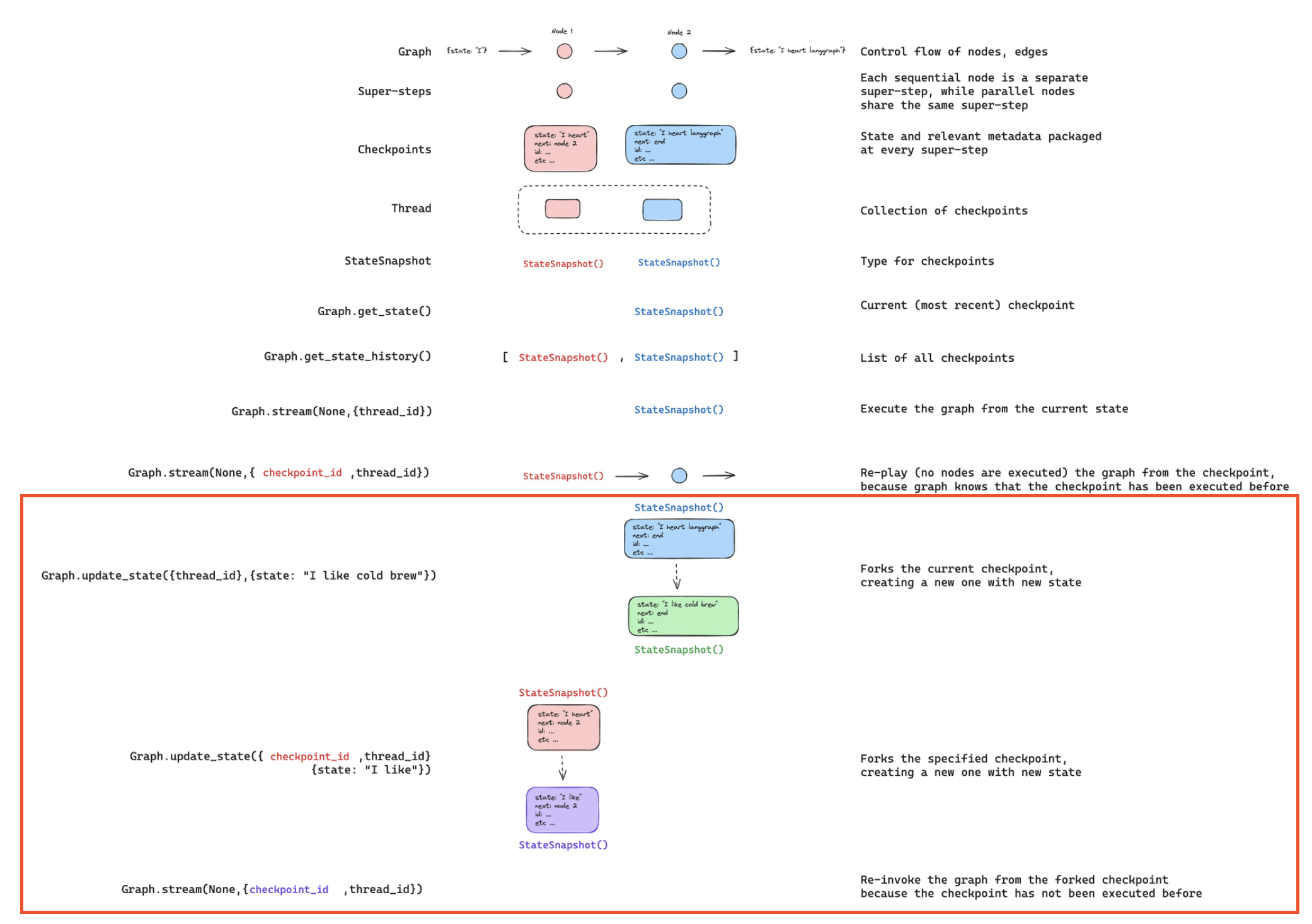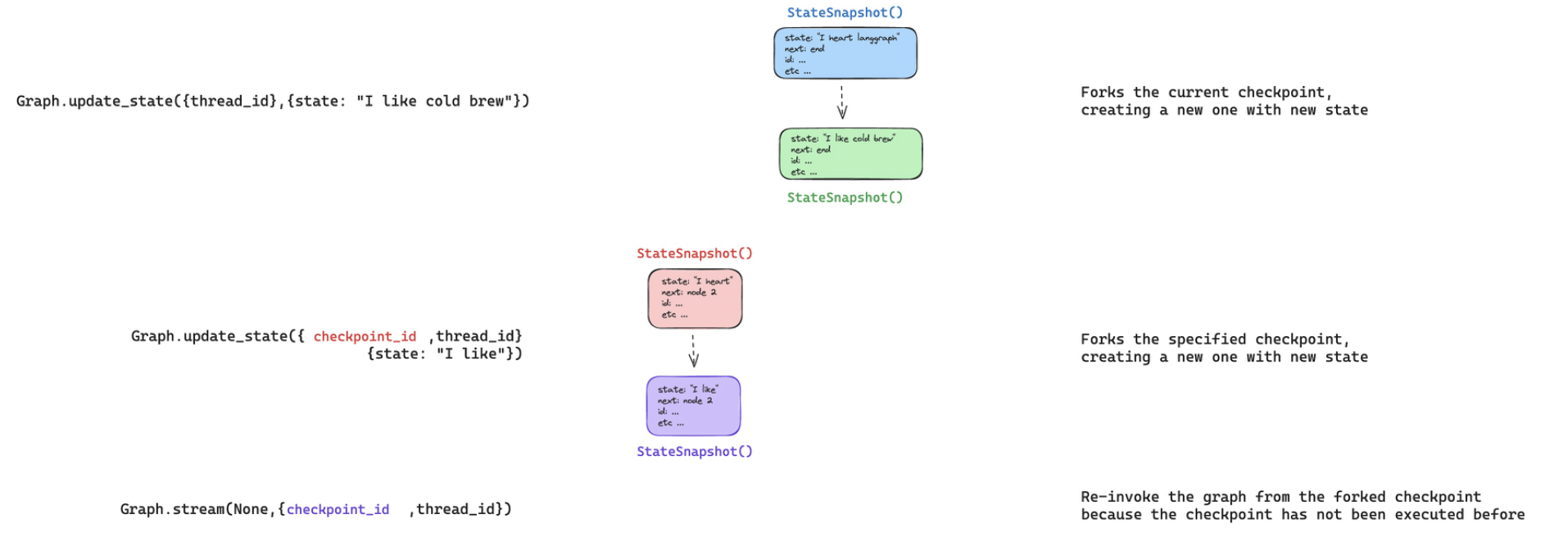langgraph - Persistence (1) checkpoint, update state
Reference
langgraphPersistence doc- with
claude
Langgraph Persistence
langgraph는 ‘체크포인팅’으로 grpah 실행에 대한 persistence(지속성, 영속성)을 제공합니다. 위 그림과 같이 그래프의 실행 과정을 Super-step과 PregelTask로 구분하고, 각 Super-step 단계를 체크포인트로 저장하도록 제공합니다.
Graph를 관리함에 있어서 thread_id와 checkpoint_id를 graph의 config 정보로 활용해
- Graph 실행 중간에 별도 처리 로직을 개발하거나(
Human-in-the-loop) - 각 실행 단계의 정보를 메모리로 관리하거나(
Store,MemorySaver) - 과거 시점의 실행 단계롤 타고 올라가거거나(
TimeTravel) - 오류가 발생 시, 마지막 성공 시점부터 재시작(‘re-execute’)하도록 하거나(
Fault-tolerance)
하는 기능을 구현할 수 있습니다.
Checkpoint
langgraph의 Persistence를 구현하는 핵심 기능이 바로 ‘checkpoint’입니다.
아래와 같은 간단한 Graph를 예시로 들어 살펴보겠습니다.
구현한 샘플 코드는 아래와 같습니다.
1
2
3
4
5
6
7
8
9
10
11
12
13
14
15
16
17
18
19
20
21
22
23
24
25
26
27
28
29
from langgraph.graph import StateGraph, START, END
from langgraph.checkpoint.memory import MemorySaver
from typing import Annotated
from typing_extensions import TypedDict
from operator import add
class State(TypedDict):
foo: int
bar: Annotated[list[str], add]
def node_a(state: State):
return {"foo": "a", "bar": ["Node a"]}
def node_b(state: State):
return {"foo": "b", "bar": ["Node b"]}
workflow = StateGraph(State)
workflow.add_node(node_a)
workflow.add_node(node_b)
workflow.add_edge(START, "node_a")
workflow.add_edge("node_a", "node_b")
workflow.add_edge("node_b", END)
checkpointer = MemorySaver()
graph = workflow.compile(checkpointer=checkpointer)
config = {"configurable": {"thread_id": "1"}}
result = graph.invoke({"foo": "", "bar": ["START"]}, config)
위 graph를 langgraph studio를 통해 테스트한 결과, 최종 output은 우하단의 JSON과 같이 bar state는 START -> node_a -> node_b로 reducers(operator.add)가 잘 작동한 것을 확인할 수 있습니다.
우리가 살펴보고자 했던 것은 checkpoint입니다.
위 graph에서는 총 4개의 checkpoint가 생성됩니다. 즉 4개의 Super-step이 존재했다는 것입니다.
1
2
config = {"configurable": {"thread_id": "1"}}
list(graph.get_state_history(config))
1
2
3
4
5
6
7
8
9
10
11
12
13
14
15
16
17
18
19
20
21
22
23
24
25
26
27
28
29
30
31
32
33
34
35
36
37
[
StateSnapshot(
values={'foo': 'b', 'bar': ['a', 'b']},
next=(),
config={'configurable': {'thread_id': '1', 'checkpoint_ns': '', 'checkpoint_id': '1ef663ba-28fe-6528-8002-5a559208592c'}},
metadata={'source': 'loop', 'writes': {'node_b': {'foo': 'b', 'bar': ['b']}}, 'step': 2},
created_at='2024-08-29T19:19:38.821749+00:00',
parent_config={'configurable': {'thread_id': '1', 'checkpoint_ns': '', 'checkpoint_id': '1ef663ba-28f9-6ec4-8001-31981c2c39f8'}},
tasks=(),
),
StateSnapshot(
values={'foo': 'a', 'bar': ['a']}, next=('node_b',),
config={'configurable': {'thread_id': '1', 'checkpoint_ns': '', 'checkpoint_id': '1ef663ba-28f9-6ec4-8001-31981c2c39f8'}},
metadata={'source': 'loop', 'writes': {'node_a': {'foo': 'a', 'bar': ['a']}}, 'step': 1},
created_at='2024-08-29T19:19:38.819946+00:00',
parent_config={'configurable': {'thread_id': '1', 'checkpoint_ns': '', 'checkpoint_id': '1ef663ba-28f4-6b4a-8000-ca575a13d36a'}},
tasks=(PregelTask(id='6fb7314f-f114-5413-a1f3-d37dfe98ff44', name='node_b', error=None, interrupts=()),),
),
StateSnapshot(
values={'foo': '', 'bar': []},
next=('node_a',),
config={'configurable': {'thread_id': '1', 'checkpoint_ns': '', 'checkpoint_id': '1ef663ba-28f4-6b4a-8000-ca575a13d36a'}},
metadata={'source': 'loop', 'writes': None, 'step': 0},
created_at='2024-08-29T19:19:38.817813+00:00',
parent_config={'configurable': {'thread_id': '1', 'checkpoint_ns': '', 'checkpoint_id': '1ef663ba-28f0-6c66-bfff-6723431e8481'}},
tasks=(PregelTask(id='f1b14528-5ee5-579c-949b-23ef9bfbed58', name='node_a', error=None, interrupts=()),),
),
StateSnapshot(
values={'bar': []},
next=('__start__',),
config={'configurable': {'thread_id': '1', 'checkpoint_ns': '', 'checkpoint_id': '1ef663ba-28f0-6c66-bfff-6723431e8481'}},
metadata={'source': 'input', 'writes': {'foo': ''}, 'step': -1},
created_at='2024-08-29T19:19:38.816205+00:00',
parent_config=None,
tasks=(PregelTask(id='6d27aa2e-d72b-5504-a36f-8620e54a76dd', name='__start__', error=None, interrupts=()),),
)
]
graph state history는 위와 같이 오래된 체크포인트가 append되며, graph.get_state_history(config)[-1]는 가장 최근의 체크포인트가 됩니다.
이처럼 checkpoint를 통해 특정 시점의 step으로 이동할 수 있기 때문에, 특정 상황에서도 무리 없이 persistence를 가져갈 수 있습니다.
Update State
checkpoint를 통해 특정 step의 State 값을 update할 수 있습니다. 이 때 graph.update_state()를 활용합니다.
1
2
3
4
5
6
7
from typing import Annotated
from typing_extensions import TypedDict
from operator import add
class State(TypedDict):
foo: int
bar: Annotated[list[str], add]
위와 같은 State를 지정했을 때, 현재 step의 state가 아래와 같다고 하면
1
{"foo": 1, "bar": ["a"]}
1
graph.update_state(config, {"foo": 2, "bar": ["b"]})
위와 같이 update를 수행하면
1
{"foo": 2, "bar": ["a", "b"]}
위와 같이 업데이트 됩니다. reducer가 적용되지 않는 channel(foo)은 overwrite 되지만, reducer channel(bar)는 update 값이 append 됩니다.
즉 overwrite 성격의 update는 reducer가 없는 channel(foo와 같은)에서만 가능합니다.
위 그림은 langgraph의 각 Super-step 별 체크포인트, 관련 API를 구조도로 그린 것입니다.
하단의 붉은 박스가 특정 step의 State를 update하는 부분입니다. 더 자세히 보겠습니다.
위 그림의 밑에서 2번째 Graph.update_state({checkpoint_id, thread_id}, {state: "value to update"}) 같이 chekpoint_id와 thread_id를 config로 지정할 경우, 특정 step의 state value를 업데이트할 수도 있습니다.



